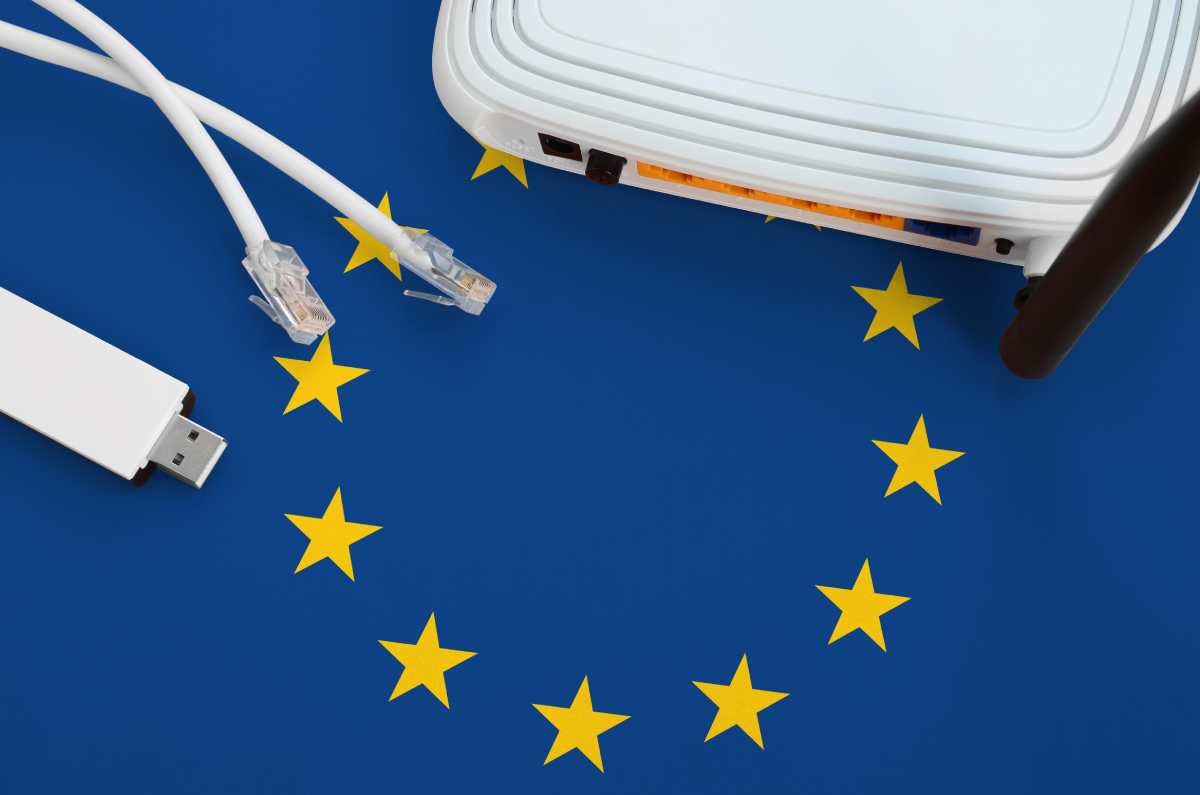How fast did it take for this web page to load?
The outcome is dependent on the gadget and the internet you’re using and your location on the globe. Typical internet connections vary greatly between countries.
If you are traveling in european countries and tired of slow internet, this guide can help you. You can prepare for your travel accordingly if you know beforehand about the internet speed and access in regions.Tpoday, for digital nomads, tourists and people on business trips, internet connectivity and speed is essential.
This article ranks the quickest (and poorest) internet connections in the globe by benchmarking fixed broadband connections in over 200 nations.

Table of Contents
- Europe’s Fastest (And Slowest) Internet Speeds Ranking Table
- Some Factors That Influence Your Internet Speed:
- How Are Internet Speeds Evaluated?
- Countries With The Fastest Internet Speeds In Europe:
- Countries with the slowest internet speeds in Europe
- Do These “Low Speeds” Actually Have An Impact?
- Mobile Internet Speeds
- The Future Of Internet
Europe’s Fastest (And Slowest) Internet Speeds Ranking Table
The following table ranks European countries based on their internet speeds, from the fastest to the slowest.
| Rank | Country | Internet Speed (Mbps) |
|---|---|---|
| 1 | Norway | 110.87 |
| 2 | Netherlands | 94.32 |
| 3 | Switzerland | 74.62 |
| 4 | Denmark | 73.42 |
| 5 | Finland | 72.80 |
| 6 | Sweden | 55.18 |
| 7 | Latvia | 48.62 |
| 8 | Romania | 47.64 |
| 9 | Belgium | 46.77 |
| 10 | Estonia | 45.72 |
| 11 | France | 45.58 |
| 12 | Lithuania | 44.80 |
| 13 | Iceland | 44.31 |
| 14 | Austria | 43.31 |
| 15 | Germany | 42.95 |
| 16 | United Kingdom | 41.35 |
| 17 | Portugal | 38.42 |
| 18 | Italy | 34.31 |
| 19 | Spain | 32.29 |
| 20 | Greece | 26.31 |
| 21 | North Macedonia | 26.91 |
| 22 | Turkey | 22.10 |
| 23 | Hungary | 21.88 |
| 24 | Slovenia | 20.76 |
| 25 | Poland | 19.75 |
| 26 | Croatia | 18.75 |
| 27 | Ireland | 18.25 |
| 28 | Czech Republic | 18.03 |
| 29 | Slovakia | 17.10 |
| 30 | Ukraine | 14.92 |
| 31 | Bosnia and Herzegovina | 14.18 |
| 32 | Belarus | 13.37 |
| 33 | Serbia | 12.83 |
| 34 | Bulgaria | 12.32 |
| 35 | Montenegro | 11.31 |
| 36 | Albania | 10.71 |
| 37 | Moldova | 9.10 |
| 38 | Kosovo | 8.10 |
The source of this data is Cable.co.uk’s annual worldwide broadband speed league report.
Some Factors That Influence Your Internet Speed:
Before getting started, it’s critical to grasp the primary elements that influence a region’s broadband speed. In general, internet speed is determined by:
- Infrastructure refers to the wiring (copper or fiber-optic) that a country uses to provide its internet connection. Generally, the quicker the connectivity, the better the infrastructure.
- It is critical to be close to or connected to undersea cable systems because these vast undersea optical fibers convey around 97% of the world’s data sources and content information.
- The magnitude of a nation, since its landmass influences the cost of upgrading infrastructure. The smaller the country, the less expensive it is to update the wiring.
- Funding matters, as does how much the elected government of the country prioritizes internet connectivity.
Other variables, such as limitation and purposeful bandwidth limitation, may also impact a country’s connection speed, similar to the situation in Turkmenistan.
When the increase of broadband internet in previous quarters is considered, 2018 was indeed an excellent year. On a worldwide scale, overall downloading and uploading performance on broadband connections and cellular data has grown.
With gigabit services expanding and 5G just on the verge, the internet is an indisputable focal point in every nation’s economy and a fundamental aspect of modern society.
However, the global internet environment is not uniform. Various countries have different traits and prospects when it comes to technical developments and online infrastructure.
These many characteristics influence internet speed, which is affected by:
—the user’s location when surfing online,
— the location of the web destination
— the network features and reliability that the broadband connection must pass through along the route.
How Are Internet Speeds Evaluated?
Before we look at Europe’s fastest and worst internet speeds, let’s have a look at how speed is determined and calculated.
Broadband speed is calculated in megabits per second and pertains to how quickly information or material moves from the Webpages to your mobile phone or laptop.
When determining the typical internet speed for a region, two basic categories of speeds are considered:
— Downloading rates, or how quickly digital files are downloaded from the web to your device.
— Upload rates, or the rate at which digital and electronic information is sent by your device to the web
To further simplify the Mbps definition, each Megabit is equal to 1,024 Kilobits. 1 Megabit / second is 1,000 times quicker than one Kilobit per second (Kbps).
Broadband (heavy capacity) internet is specified as downloading rates of at least 768 Kbps and transfer speeds of at least 200 Kbps.
Countries With The Fastest Internet Speeds In Europe:
| Rank | Country | Internet Speed (Mbps) |
|---|---|---|
| 1 | Iceland | 216.56 |
| 2 | Liechtenstein | 166.22 |
| 3 | Andorra | 159.80 |
| 4 | Luxembourg | 131.50 |
| 5 | France | 120.01 |
| 6 | Spain | 115.61 |
| 7 | Netherlands | 113.90 |
| 8 | Romania | 112.39 |
| 9 | Malta | 107.70 |
| 10 | Monaco | 100.26 |
It should come as no surprise that Europe has the greatest density of nations with the quickest internet. Europe is home to six of the top ten nations with the fastest internet. With a typical speed of 216.56Mbps, Iceland boasts the fastest broadband in both Europe and the whole world.
France, Luxembourg, Liechtenstein, and Andorra follow suit closely. With a speed of 72.06Mbps on average, the UK is ranked 27th. Europe has once again dominated the standings, owing to its generally good network.
In every case, the nations with the best rankings are those with a significant concentration on 100% pure fiber (FTTP) networks, with those focusing excessively on FTTC and ADSL solutions falling farther down year on year.
There’s also a direct relationship between the extent of the geographic location in issue and the speed given, with tiny countries/locations being simpler to maintain and update and, as a result, frequently giving quicker average speeds.
It is no wonder really, that the population of Iceland is just over 350,000; a tiny number for a whole country. Or take Liechtenstein, which has a measly population of just over 34,000.

Countries with the slowest internet speeds in Europe
At the opposite end of the spectrum, Turkey has the slowest fixed broadband, with a speed barely crossing 22 Mbps in 2022. As mentioned above, this is large because of government regulation and intervention.
| Country | Internet Speed (Mbps) |
|---|---|
| Turkey | 22.10 |
| Georgia | 24.98 |
| Greece | 26.31 |
| North Macedonia | 26.91 |
| Bosnia & Herzegovina | 31.30 |
| Kosovo | 37.53 |
| Albania | 38.40 |
| Croatia | 45.26 |
| Cyprus | 46.79 |
Do These “Low Speeds” Actually Have An Impact?
There are many reasons why the countries with the slowest internet in Europe suffer. One reason is that these countries have not invested in the infrastructure needed to support high-speed internet.
Another reason is that the population in these countries is generally older and less likely to use the internet. Finally, these countries tend to be less developed economically, which means that they have less money to invest in high-speed internet.
An intriguing finding is that, despite Cyprus, which is in a comparable scenario, ranking around the bottom, nations that rely heavily on the Internet today, like Malta and Estonia, have risen dramatically.
Unfortunately, but not unexpectedly, some of the top locations for creative professionals and digital nomads are at the bottom of the list: Greece, Croatia, and Georgia are among the most well-known hotspots for DNs, but it seems like they just can’t maintain their popularity.
Even still, there has been a significant improvement if you compare the figures from 2016. And If you ask me, even the nations with the lowest number still provide speeds that are adequate to carry out nearly any online activity without any hitches or issues, so there is no significant difference. The work you did in Iceland could easily be done in Turkey too!
Mobile Internet Speeds
Another thing to bear in mind is that the performance of mobile data is ranked differently than that of broadband networks.
However, if you intend to use your smartphone primarily – or if you want to purchase a mobile data package or sim card for usage while traveling in Europe – we have an entirely different image.
All the more unexpected, in my judgment, are the nations that score reasonably low in respect of cable broadband speed yet rank extremely high when it comes of mobile data speed.
Some of the fastest Mobile data Countries are:
Norway boasts a speed of 110.87 Mbps. Netherlands in second with 94.32 Mbps and then Bulgaria, Cyprus, Denmark, Switzerland, Croatia, Finland, and Belgium all around the 70-80 Mbps mark, respectively.
Belarus with 15.13 Mbps, Ukraine having 24.83 Mbps, Georgia with 30.12 Mbps, and Ireland with an average of 30.78 Mbps, have the worst mobile data speeds. To be honest, I wasn’t ready to see Ireland here!
Surprisingly, Romania, which ranks third in broadband internet speed, only offers an aggregate mobile data bandwidth of 38.09 Mbps, demonstrating that even if a state has faster internet networks, it does not automatically offer the same speeds on its mobile data side.
Just take a look at the top ten quickest nations: it’s a whole different group of nations ranked there.
Even more significant, all of the top ten nations have not only moved up in the rankings relative to last year, but they also increased their mean mobile data speed by roughly 20 Mbps. And the speeds are likely to increase more!
The Future Of Internet
New ideas and advancements are transforming the digital environment, with 5G networks being increasingly widespread throughout the world.
Due to the continually changing dynamics of this sector, the data underlying this ranking is regularly updated to present the most up-to-date picture of internet connections worldwide.

This indicates that the internet speed meter is continuously rising as faster, better links get to be the norm. Countries that aren’t prepared to manage these beefed-up networks will fall even farther behind.
Even though all this data emphasize that the world wide web is increasing at a higher rate every year, it is equally vital that we realize the fundamental flaws within those measurements:
The biggest contributors to the increased world average connection speeds are industrialized countries with organized systems and developed infrastructure and continual technical developments.
Furthermore, the slowest countries demonstrate minimal progress in terms of accessibility and reliability, push of technological advances, and adoption of faster internet infrastructure. Year after year, the nations with the quickest rates are likely to become more sophisticated and smaller in size. The bigger and less industrialised the country, the poorer the internet will most likely be.

